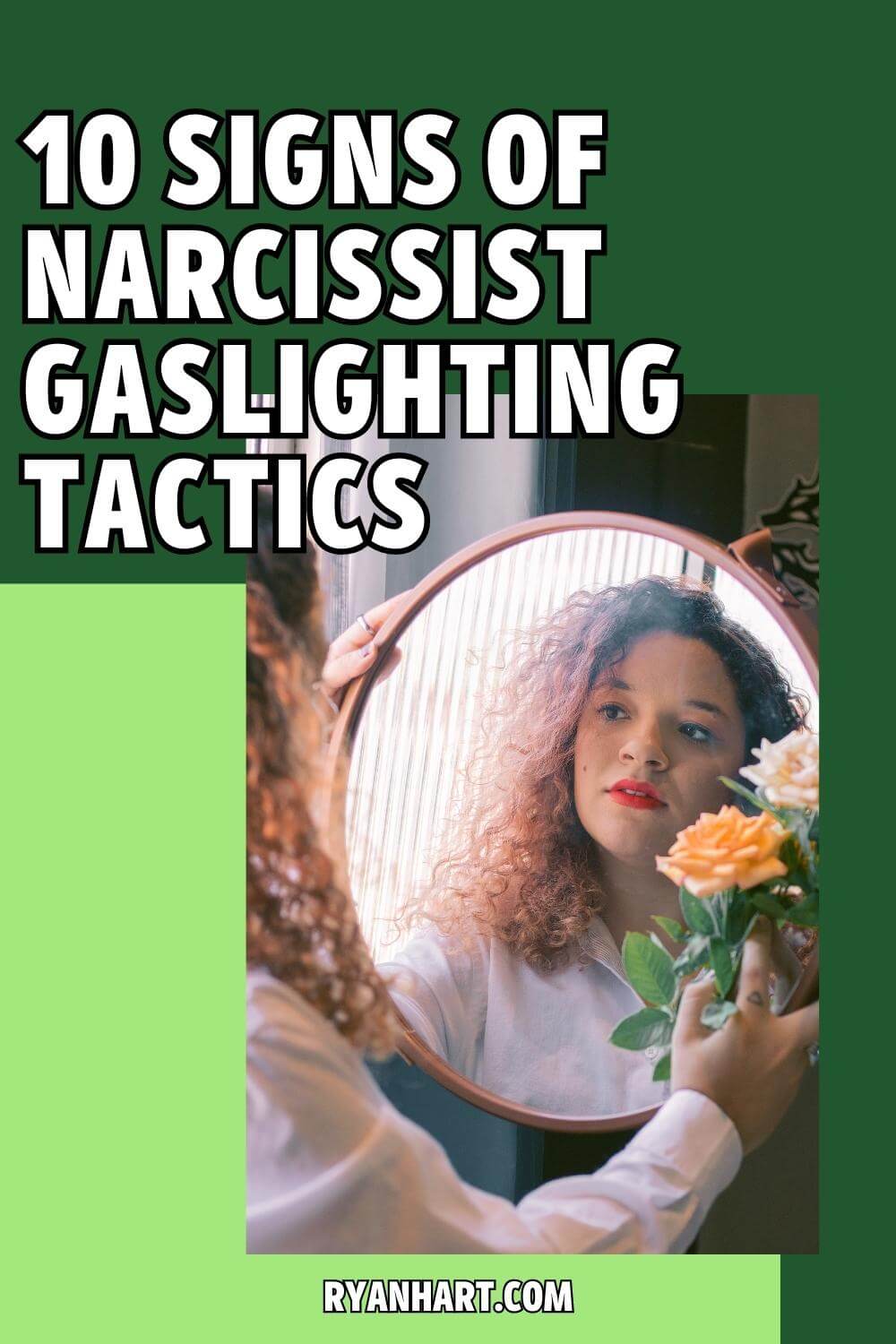10 Signs of Narcissist Gaslighting Tactics
by Ryan Hart | Updated on May 17, 2024 | Post may contain affiliate links. As an Amazon Associate we earn from qualifying purchases.
Do you ever feel like you’re going crazy? Like you can’t trust your own memory or perception of reality?
You may be experiencing gaslighting, a manipulative tactic narcissists use to gain power and control over their victims. Narcissistic gaslighting can be subtle and insidious, leaving you feeling confused, anxious, and isolated.
In this article, we will explore 10 signs of narcissistic gaslighting tactics so you can recognize them and protect yourself from their harmful effects.

What is Narcissistic Gaslighting?
Gaslighting is a form of emotional abuse involving denying, distorting, or manipulating the truth to make someone doubt their memory, perception, or sanity.
Narcissists are particularly adept at gaslighting, using it to maintain their sense of superiority and control over others. They may use gaslighting tactics to undermine your confidence, make you feel crazy or incompetent, or isolate you from friends and family.
If you suspect that you are being gaslit, it’s important to trust your instincts and seek support from a trusted friend, family member, or mental health professional.
What is Narcissism?
Narcissistic Personality Disorder (NPD) is a mental health condition that falls under the umbrella of personality disorders. It is characterized by a pervasive pattern of grandiosity, a need for admiration, and a lack of empathy.
People with NPD often have a false sense of superiority and entitlement and may exploit others to achieve their goals.
Narcissists often have a “false self” that they present to the world. This false self is a persona that they create to hide their true selves, which are often insecure, vulnerable, and full of self-doubt. They may use this false self to manipulate others and gain admiration and attention.
Narcissism is not just a personality trait; it is a personality disorder that can significantly impact the lives of those around the narcissist. Narcissists may use gaslighting, emotional abuse, and other manipulative tactics to maintain their power and control over others.
Common Gaslighting Tactics
Gaslighting is a manipulative tactic that is often used by people with narcissistic personality disorder (NPD). It is a form of emotional abuse that involves distorting, altering, or denying reality in order to make someone doubt their own perception, memory, or sanity.
Gaslighting is a common tactic used by narcissists to gain power and control over their victims.
Gaslighting can be difficult to identify, especially if you are in a relationship with a narcissist. The manipulative behavior is often subtle and gradual, making it hard to recognize until it has already taken hold.
Some common signs of gaslighting include:
- Denying things that have happened
- Blaming you for things that are not your fault
- Making you doubt your own memory or perception of events
- Telling you that your feelings are wrong or invalid
- Making you feel like you are going crazy
- Using your insecurities against you
- Making you feel like you are always in the wrong
- Twisting your words or the facts to suit their own agenda
- Dismissing your opinions or ideas
- Making you feel like you are not good enough
Signs of Narcissist Gaslighting
Here are some common signs of narcissist gaslighting tactics to watch out for:
Creating Doubt
Narcissist gaslighters often create doubt in their victim’s mind by denying or contradicting their experiences or emotions. They may tell you that you are overreacting or being too sensitive, making you doubt your feelings and emotions.
Denial and Lying
Narcissist gaslighters may deny or lie about events that occurred. They may tell you that you never said or did something, even though you know that you did. This can make you doubt your own memory and reality.
Trivializing and Exaggerating
Narcissist gaslighters often trivialize your feelings or experiences. They may tell you that what you are feeling or experiencing is not a big deal or that you are making a mountain out of a molehill. On the other hand, they may exaggerate their own experiences or accomplishments to make themselves appear superior.
Blocking and Diverting
Narcissist gaslighters may block or divert conversations to avoid taking responsibility for their actions. They may change the subject or refuse to engage in a conversation that makes them uncomfortable. This can make you feel like your concerns are not being heard or addressed.
Intermittent Reinforcement
Narcissist gaslighters may use intermittent reinforcement to keep you hooked on their approval. They may give you praise or affection one minute and then withdraw it the next. This can make you feel like you are constantly walking on eggshells and unsure of where you stand with them.
The Impact of Gaslighting
Gaslighting is a form of emotional abuse that can significantly impact your mental health, self-esteem, and relationships. Here are some of the ways gaslighting can affect you:
Effects on Mental Health
Gaslighting can lead to anxiety, depression, and other mental health issues. When someone is constantly questioning your reality, it can make you doubt yourself and your perceptions. This can lead to feelings of confusion, helplessness, and even paranoia.
Influence on Self-Esteem and Self-Worth
Gaslighting can also have a negative impact on your self-esteem and self-worth. When someone constantly puts you down or makes you feel like you’re not good enough, it can make you question your value. This can lead to feelings of worthlessness, inadequacy, and low self-confidence.
Relationships and Social Circle
Gaslighting can also damage your relationships and social circle. When someone is trying to gain control and power over you, it can lead to feelings of isolation and loneliness. Gaslighting can also make it difficult to trust others and form and maintain healthy relationships.
Recognizing and Handling Gaslighting
If you suspect that you are a victim of gaslighting, it is important to recognize the signs and take action to protect yourself:
Setting Boundaries
One of the most effective ways to deal with gaslighting is to set clear boundaries. This means identifying your limits and communicating them to the gaslighter. For example, you can tell them that you will not tolerate being called crazy or being told that your feelings are invalid. Stick to your boundaries, and do not let the gaslighter cross them.
Seeking Support
Dealing with gaslighting can be overwhelming, and seeking support from people who understand what you are going through is important. This can be friends, family, or a therapist. Having someone to talk to can help you gain perspective and feel less alone.
Therapy and Coping Strategies
Therapy can be an effective way to cope with the effects of gaslighting. A therapist can help you identify the gaslighting tactics being used against you and develop strategies to deal with them. Coping strategies can include mindfulness, journaling, and self-care activities like exercise and meditation.

Frequently Asked Questions
What are some common phrases used by narcissists to gaslight their victims?
Narcissists use various phrases to gaslight their victims, such as “You’re crazy,” “You’re overreacting,” “That never happened,” “You’re too sensitive,” and “You’re imagining things.” These phrases are meant to make you doubt your own memory and perception of reality.
How can you recognize if a narcissist is gaslighting you?
Gaslighting is a form of emotional abuse that can be difficult to recognize. Some signs that a narcissist is gaslighting you include feeling confused, anxious, and constantly second-guessing yourself. You may also feel like you are walking on eggshells around the narcissist, afraid to say or do anything that might upset them.
What are some warning signs that your partner may be a narcissist who is gaslighting you?
If your partner is a narcissist who is gaslighting you, you may notice some warning signs, such as a lack of empathy, a need for constant admiration, and a sense of entitlement. They may also be controlling, manipulative, and dismissive of your feelings and needs.
What are some strategies for fighting back against gaslighting by a narcissist?
One strategy for fighting back against gaslighting by a narcissist is to keep a journal of your experiences and feelings. This can help you stay grounded in reality and provide evidence to support your claims. You can also seek support from friends, family, or a therapist who can help you see things more clearly and develop coping strategies.
What are some red flags to look out for in a relationship that may indicate gaslighting by a narcissist?
Some red flags to look out for in a relationship that may indicate gaslighting by a narcissist include feeling like you are constantly walking on eggshells, being made to feel like you are crazy or overreacting, and feeling like you are always wrong or at fault. You may also notice that your partner is controlling, manipulative, and dismissive of your feelings and needs.
How can you protect yourself from gaslighting tactics a narcissistic coworker or boss uses?
If you are dealing with gaslighting tactics from a narcissistic coworker or boss, it is important to document any incidents and seek support from HR or a supervisor. You can also set clear boundaries and communicate assertively, refusing to engage in any gaslighting or manipulative behavior. It may also be helpful to seek support from a therapist who can help you develop coping strategies and build resilience.
This newsletter is not just good - it delivers the best relationship advice to your inbox every morning Join thousands of subscribers discovering how to stop chasing emotionally unavailable people and start attracting true love.
Don't miss the chance to add your name to the list before the next edition goes live. If you want to take advantage of this opportunity, simply click the below to access our secure sign-up page.
Try the Newsletter
Ryan Hart is a certified relationship coach and writer. His mission is to help make connections between people better, stronger, more meaningful, and longer lasting using technology.
Want to connect with Ryan? Click here to get his FREE daily dating advice newsletter
